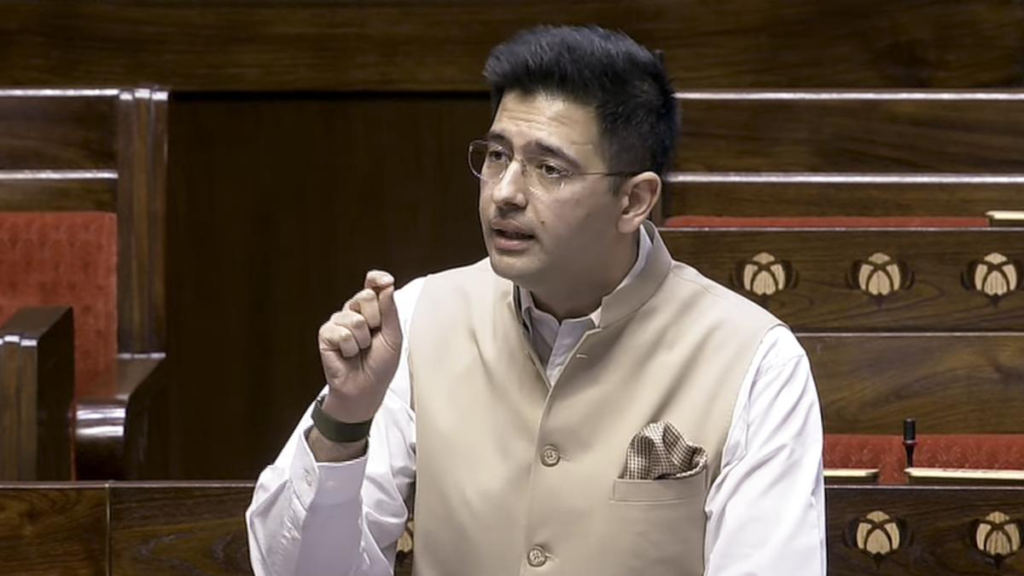Raghav Chadha, the top Aam Aadmi Party (AAP) leader and Rajya Sabha MP, has come to the aid of international students, including many Indians, whose academic future is uncertain following the recent decision of former U.S. President Donald Trump to limit foreign student intake in leading American universities, such as Harvard. The move, which has been widely panned globally by educators, has triggered scathing debate over the way forward for international education.
On Saturday, Raghav Chadha publicly denounced the move as “unjust, discriminatory, and regressive.” In a statement that was posted on social media, he appealed to the Indian government to intervene diplomatically to protect the interests of concerned Indian students and to seek policy reversals. He also requested Indian institutions to intervene on behalf of the students whose aspirations to study at prestigious U.S. universities now hang in the balance.
The row is over the Trump administration’s order for refusing to admit new foreign students to the U.S. if their studies are online or in hybrid mode. Harvard University, one of the hardest-hit institutions, has led the fight against the order in the courts. The action may affect thousands of Indian students who had received admission for Fall 2025 and were about to travel to America.
Harvard and Indian student crisis
Back in India, the impact of this move is being strongly felt among students at Delhi University, IITs, and other high-end institutions where US graduate admissions are a regular feature. Many Indian students had received admission to Harvard’s master’s and Ph.D. courses but now stand in doubt because of visa rules related to remote learning paradigms.
Raghav Chadha called for Indian institutions and the Ministry of External Affairs to offer immediate clarity and support. “When students have navigated challenging academic barriers to secure spots in international universities, such arbitrary visa refusals are nothing short of academic betrayal,” Chadha added.
Student organizations in the country, especially in Delhi and Mumbai, have organized protests and presented memoranda to the U.S. Embassy, calling for reversal of the directive. At the same time, university authorities are counseling students on potential deferrals or other institutions in nations such as the UK, Canada, and Australia that still provide student-friendly visa policies.

Raghav Chadha: Must Indian students bank on Harvard offers in the current politically unstable environment?
This has given rise to more profound questions regarding the credibility of American higher education for Indian students. Raghav Chadha questioned if India’s brightest minds need to gamble uncertainty every few years due to shifts in foreign policy. “If the choice of an administration can sidetrack thousand of lives, we should reflect on our reliance on foreign education systems,” he said in a TV interview.
In this regard, Raghav Chadha also suggested that India needs to fast track development of internationally comparable institutions to pull and retain Indian talent. He demanded greater investments in research, faculty mobility, and international collaboration models to make Indian universities credible substitutes for American degrees.
Scholars and policy analysts voiced similar apprehensions. Jawaharlal Nehru University’s Professor Rekha Singh said, “There is now an immediate need to de-risk our academic strategy. If Harvard cannot ensure admission to its own enrolled foreign students, what message does that send to Indian aspirants?”
Harvard’s legal struggle and international backlash
Harvard, in conjunction with MIT and other top universities, has brought the Trump administration policy to court under the grounds of infringement of academic freedom and unjust punishment for international students. Universities have cautioned that such limitations will not only hurt student mobility but also negatively impact the U.S. economy and innovation ecosystem, which is highly dependent on international scholars and students.
Concurrently, international education organizations like the Association of International Educators and UNESCO have expressed concern, noting that such action goes against international assurances of education access and cultural exchange.
Indian officials have admitted receiving alarm and have assured they were in communication with their American counterparts. Official action is yet to be explained, however.
Domestic response and student advocacy
In India, Raghav Chadha’s words have fueled demands for a national academic contingency plan. Student organizations such as the All India Students’ Federation (AISF) and the Students’ Federation of India (SFI) have requested that the Ministry of Education prepare an urgent relief mechanism for impacted students in the form of special fellowships, domestic windows of admission, or partnership with international campuses that provide remote programs with in-campus credit validation.
During a recent press meet, Raghav Chadha also called upon Indian private institutions to develop responsive bridge courses with flexibility that enable mid-stream international students to resume their studies without interruption.
He further stated, “This is not the moment for watching things happen. India needs to take proactive measures to safeguard the dreams of its youth and continue to be a knowledge and talent contributor to the world.”
Although the ultimate result of the legal challenge in the U.S. is still uncertain, one thing is certain — the consequences of the Trump administration’s visa order are being experienced across borders. With public figures such as Raghav Chadha coming forward to bring attention to the student crisis, the subject is attracting political and diplomatic focus.
India is now confronted with the double challenge of fighting its students abroad while building its own education system in-country to minimize exposure to external shocks.
For most Indian students with Harvard acceptance letters in hand, the future is fraught with anxiety, confusion, and difficult decisions. But with figures such as Raghav Chadha foregrounding the debate in the public domain, students can hope to be better represented and assisted in this academic storm.
ALSO READ
Trump Administration Threatens 27% of Harvard Students
Harvard Faces Visa Crisis as Chinese Students Denied U.S. Entry